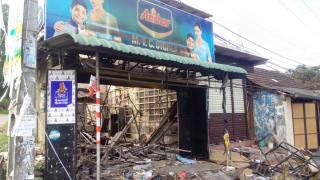
Following a spate of violent attacks on Muslims in Sri Lanka, UNA-UK calls for the international community to step up efforts to foster lasting peace in the country.
Starting on March 4 and continuing as we speak, mosques, homes and businesses have been burnt to the ground in a series of riots and attacks led by hardline nationalists, including Buddhist monks. Several people have reportedly been killed.
Sri Lanka has a dark history of ethnic pogroms. Many were carried out against the Tamil community in the lead-up to the civil war that engulfed the country for nearly 30 years. According to UN and other estimates, as many as 100,000 civilians may have died in the final stages of the conflict alone. Credible allegations and evidence of war and atrocity crimes have since emerged.
Sri Lanka is an important test case for how the international community responds to allegations of this kind. The UN’s Human Rights up Front initiative was set up as a response to systemic failures identified in the organisation’s handling of the crisis, and it remains a case study for the work of the UN’s Human Rights Council: both at its best and its worst.
The UN has helped to guide Sri Lanka and the international community towards a plan of action, contained in Human Rights Council resolution 30/1, which would have laid the foundations for a lasting peace in Sri Lanka. Indeed, it is regularly touted as a ‘success story’ for the Council. However, the proof lies in implementation and as reported by the Sri Lanka Campaign earlier this week: “the overwhelming majority of the commitments made by the government of Sri Lanka remain either mostly or completely unachieved.” This current outbreak of violence also shows that many of the root causes of the civil war remain unaddressed.
States must use the current session of the Human Rights Council, at which progress on resolution 30/1 is due to be discussed, to put pressure on Sri Lanka to honour its commitments and to uphold its responsibility to protect all citizens, Muslims included.
As the UN High Commissioner for Human Rights Zeid Ra'ad Al Hussein said,
“I am very alarmed by recurring and continuing episodes of mob violence targeting ethnic and religious minorities, particularly Muslims [...] There should be no impunity, either for the incitement that led to the attacks, or the attacks themselves. I have repeatedly urged the Government to advance its implementation of the transitional justice agenda. I regret the absence of meaningful progress. It is urgent for the sake of the victims that progress be made on accountability and transitional justice. In the absence of such progress I would encourage Member States to explore the use of universal jurisdiction.”
The United Kingdom is well placed to take the universal jurisdiction approach; it has the relevant legislation and is a frequent travel destination for accused members of the current and former administrations.
An additional responsibility is placed on the UK as an upholder of the rules based international system, as hosts of the upcoming Commonwealth Summit, as one of the states who led the drafting of the Human Rights Council resolution and because, as a Security Council member, the UK is expected to lead the international community in upholding its “responsibility to protect” civilians from atrocities.
The UK should use its influence to push for full implementation of Human Rights Council resolution 30/1 and should attempt to prosecute any visitors to the UK against whom there are allegations of atrocity crimes.
Photo via twitter, user: @Mari_deSilva






